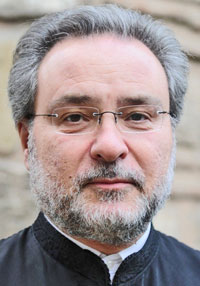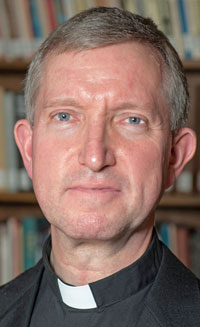Two experts on the topic will discuss “From Mutual Excommunications to Growing Communion: Orthodox-Catholic Dialogue 50 Years After Vatican II” at 7 p.m. Monday, Nov. 9, in the auditorium of O’Shaughnessy Educational Center on the St. Paul campus of the University of St. Thomas.
The experts are the Rev. Dr. John Chryssavgis, a Greek Orthodox theologian and archdeacon of the Ecumenical Patriarchate, and Monsignor Paul McPartlan, a professor of systematic theology and ecumenism at Catholic University of America.
Their discussion, free and open to the public, is co-sponsored by St. Thomas’ Institute for Catholicism and Citizenship, Theology Department, Aquinas Chair in Theology and Philosophy Dr. Paul Gavryluk, and College of Arts and Sciences. More information can be found here.
Dr. Massimo Faggioli, director of the institute, said Chryssavgis and McPartlan will talk about the ecumenical relations between Catholics and Orthodox at 50 years from the lifting of the excommunications between the two churches in 1965. “The development of the relations between Catholics and Orthodox is part of a larger picture of ecumenism in contemporary Christianity and of our globalized world,” he said.
Chryssavgis, who was born in Australia and studied in Athens and Oxford, is the adviser to Ecumenical Patriach Bartholomew and has published many books, including the 2014 Dialogue of Love: Breaking the Silence of Centuries.
McPartlan is a priest of the diocese of Westminster in England and since 2005 has served on the Joint International Commission for Theological Dialogue between the Roman Catholic Church and the Orthodox Church. His several books include the 2013 A Service of Love. Papal Primacy, the Eucharist, and Church Unity.
The Institute for Catholicism and Citizenship, part of the university’s Theology Department, was announced in March and promotes theological, interdisciplinary inquiry into economic, political and social issues.








